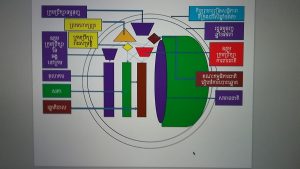Monarchy stuck in middle of Cambodia’s conflict
Op-Ed: Asia Time
Hun Sen, one of the world’s longest serving leaders, has had notoriously rocky relations with the royal family. In 2003, King Sihanouk claimed CPP soldiers and police were threatening him when he refused to inaugurate the National Assembly after a controversial election.

 Two years later, Hun Sen said he might dissolve the monarchy entirely when newly crowned Sihamoni did not immediately agree to sign a controversial border treaty with Vietnam.
Two years later, Hun Sen said he might dissolve the monarchy entirely when newly crowned Sihamoni did not immediately agree to sign a controversial border treaty with Vietnam.
Hun Sen’s about-face from would-be monarchy dissolver to stout monarchy defender has raised concerns that the stiffened law is designed more to stifle political opponents than preserve the dignity of the monarch.
Paul Chambers, a regional analyst and lecturer at Thailand’s Naresuan University, said it is now evident the lese majeste law “is being used to intimidate and imprison members of the political opposition.”
“Rather than really protecting the king’s dignity, the implicit intent of these arrests is to merge anti-CPP activity with insulting the king, as if the CPP were the political party of the king,” he said via email.
Chambers said this is similar to how the lese majeste law is sometimes abused in Thailand, where politicians and officials have hurled anti-royal charges to undercut rivals and opponents.
“The only difference between the Cambodian and Thai case is that for Cambodia the lese majeste law was constructed by a prime minister for his own benefit,” Chambers said.
The anti-royal law’s amendment was first proposed by Interior Minister Sar Kheng in December, along with a series of other controversial laws.
When called for comment on the law’s recent use, Ministry of Interior spokesman Khieu Sopheak lambasted this reporter. “You are a pig from a European country,” he repeatedly shouted.
====

Former CNRP president Sam Rainsy said the law was passed to give the ruling CPP legitimacy as the defender of the monarchy because it has lost popular legitimacy in the eyes of the people.
“The regime needs to secure some kind of cheap legitimacy — such as the one derived from the CPP’s allegedly defending a tamed monarchy — at a time when the only real and indisputable legitimacy that is based on popular support is vanishing with the elimination of the opposition and the civil society,” he told Asia Times.
Rainsy, who has lived in self-imposed exile since 2015 to avoid a series of politically-tinged charges and convictions, penned an open letter to Sihamoni urging him not to support the upcoming election. In the letter, dated May 23, he wrote: “Everyone knows that the vote in question does not constitute a real election.”
